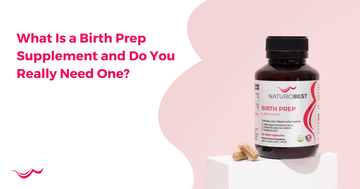Vitamin B12 in Pregnancy: What You Need to Know
by NaturoBest Naturopath Team on Feb 13, 2024

Vitamin B12 is an essential nutrient for overall health and plays an important role in both maternal wellbeing and your baby’s development during pregnancy. Monitoring vitamin B12 levels throughout pregnancy is worthwhile, as deficiency is relatively common and can impact both mother and baby if left unaddressed.
Managing a vitamin B12 deficiency during pregnancy may involve dietary changes, supplementation and, in some cases, B12 injections. Taking a high-quality prenatal multivitamin alongside a nourishing diet can help support nutritional requirements and maintain a healthy pregnancy.
Why Vitamin B12 Matters in Pregnancy
- Vitamin B12 supports healthy foetal brain and nervous system development
- Symptoms of vitamin B12 deficiency may include fatigue, brain fog, anaemia, or numbness and tingling in the hands or feet
- Management may involve increasing dietary B12 intake, supplements, or B12 injections under medical guidance
Roles of Vitamin B12 in Pregnancy
Vitamin B12 is required for healthy foetal nervous system and brain development. Emerging research suggests that B12, together with folate, may help reduce the risk of nervous system–related birth defects such as spina bifida. B12 also plays a role in cell replication and helps regulate foetal growth.
For the mother, vitamin B12 is equally important. It supports adult brain and nervous system health and contributes to memory, learning, mood regulation and energy levels. B12 is also required for the production of healthy red blood cells and normal circulation during pregnancy.
Taking Prenatal Vitamins With Anaemia
Anaemia is common during pregnancy and may result from iron deficiency, vitamin B12 deficiency, or a combination of both. There are different types of anaemia, including microcytic and megaloblastic anaemia.
Microcytic anaemia occurs when red blood cells are smaller than normal, while megaloblastic anaemia involves abnormally large red blood cells and is more commonly associated with vitamin B12 deficiency. Both types impair the delivery of oxygen and nutrients to body tissues.
Your healthcare provider can assess this through blood tests. Elevated mean cell volume (MCV) and homocysteine levels may indicate a vitamin B12 deficiency. Iron levels are typically assessed at the same time, alongside a full blood count.
Many women wonder whether they should continue taking their prenatal vitamin if they are anaemic. In most cases, healthcare providers recommend continuing a prenatal multivitamin while treating the underlying B12 deficiency.
Vitamin B12 Deficiency and Management During Pregnancy
In addition to anaemia, symptoms of vitamin B12 deficiency may include:
- Fatigue
- Breathlessness
- Nervous system symptoms such as numbness, tingling or poor balance
- Poor concentration or memory
- Paleness
- Mood changes, including low mood, anxiety or disrupted sleep
Some women are more susceptible to vitamin B12 deficiency than others. Those following vegetarian or vegan diets may have lower dietary intake of B12. Poor absorption can also contribute to deficiency and may occur with digestive conditions such as inflammatory bowel disease, irritable bowel syndrome or coeliac disease.
Genetic factors may also play a role. Variations in the MTHFR gene can affect how the body metabolises B vitamins, including B12. These genetic variations are relatively common, which is why active folate forms are often preferred over folic acid in prenatal formulations.
Understanding the impact of vitamin B12 deficiency during pregnancy is important. Being informed empowers women to take proactive steps toward supporting their health and their baby’s development.
Low B12 levels during pregnancy have been associated with an increased risk of low birth weight, preterm birth and miscarriage. Deficiency has also been linked with a higher likelihood of pre-eclampsia, gestational diabetes and excess weight gain during pregnancy.
The good news is that vitamin B12 deficiency is common and usually straightforward to manage with appropriate medical support. Management typically includes increasing intake of B12-rich foods, using high-quality B12 supplements, and in some cases receiving B12 injections prescribed by a healthcare provider.
B12 Injections and Supplements During Pregnancy
Vitamin B12 exists in several forms, making it important to understand what is included in prenatal supplements.
Hydroxocobalamin is the form of vitamin B12 naturally found in food. Cyanocobalamin is a synthetic form commonly used in lower-cost supplements. The two active forms of B12 used by the body are methylcobalamin and adenosylcobalamin, both of which can be produced from hydroxocobalamin.
Supporting dietary intake alongside supplementation is important for optimal pregnancy health. Foods rich in vitamin B12 include mushrooms, nutritional yeast and animal products such as meat, dairy, butter and eggs.
In some cases, healthcare providers may recommend B12 injections during pregnancy. These injections use hydroxocobalamin, and research indicates that oral supplementation can offer absorption comparable to injections in many situations.
In Summary
Vitamin B12 is essential for both foetal development and maternal wellbeing during pregnancy. Levels can be supported through diet, supplementation and, when required, medical treatment such as injections. Prenatal vitamins play a valuable role in supporting nutritional intake alongside a balanced, healthy diet, helping to support a healthy pregnancy for both mother and baby.
- 5-MTHF,
- best pregnancy vitamin,
- best pregnancy vitamins,
- best prenatal vitamin,
- best prenatal vitamins,
- boost brain health,
- brain development,
- folic acid,
- healthy pregnancy,
- high quality prenatal supplements,
- high quality prenatal vitamins,
- MTHFR,
- Pregnancy,
- pregnancy health,
- pregnancy nutrition,
- pregnancy vitamins,
- Pregnant,
- prenatal,
- prenatal vitamins,
- supplements during pregnancy,
- Vitamin B12




